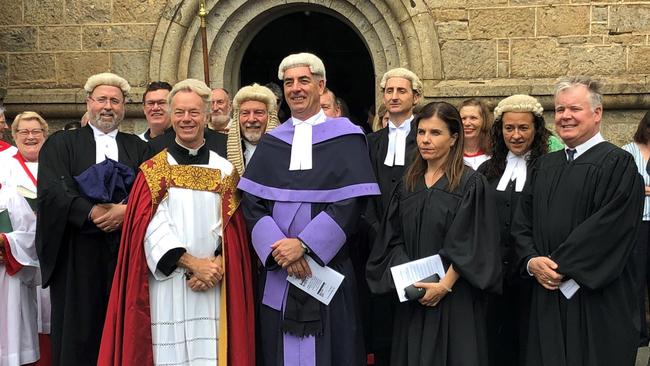Judge accuses NSW top prosecutor of ‘blatant judge shopping’
Judge Sean Grant said the attempt by NSW Director of Public Prosecutions Sally Dowling to throw him off the case has no merit and ‘brings the administration of justice into disrepute’.

A NSW District Court judge has launched a stinging attack on the state’s Director of Public Prosecutions, accusing her of the most blatant “judge shopping” he had seen in 35 years in the law, in a bid to stop him imposing lenient sentences on two 15-year-old boys.
Judge Sean Grant said the attempt by DPP Sally Dowling to force him off the case because of apprehended bias “brings the administration of justice into disrepute”.
“The Director’s application is misconceived and without merit,” Judge Grant said, refusing the DPP’s application to recuse himself from the case.
Ms Dowling has also lodged a complaint against Judge Grant with the Judicial Commission alleging he “might not bring an impartial and unprejudiced mind” to sentencing one of the boys.
The extraordinary spat will escalate the already bitter row between Ms Dowling and the state’s judiciary, which has previously focused on claims that public prosecutors are putting sexual assault cases before the courts without the required scrutiny, and instead are choosing the “easy” option of letting a jury decide.
Last year three NSW District Court judges expressed concerns about a trend of “unmeritorious” cases being brought before courts, risking miscarriages of justice and in December a fourth judge called for the “lazy and perhaps politically expedient” referrals of baseless accusations to the court to stop after the case of a man who spent eight months on remand in jail and faced a jury trial despite never committing a crime.
A number of prosecutors within the Office of the Director of Public Prosecutions are believed to have been unhappy with Ms Dowling’s decision to apply for Judge Grant’s recusal.

A legal source said: “Judge Grant is highly respected by almost all the practitioners who appear in front of him, so this attack on His Honour’s impartiality was really disappointing.”
Judge Grant was appointed to the District Court in 2019 after a long career at the bar, where he appeared in every state and territory, as well as the High Court. At his swearing-in Chief Judge Derek Price described him as a “highly talented trial advocate, forensic in your attention to detail and a formidable opponent”.
In this case before Judge Grant, BP, a 15-year-old boy together with two other boys, JT and AF, of the same age were all Year 10 boarding students at a school in regional NSW.
In March 2022 the complainant, TP, another 15-year-old boy, had returned to their shared dormitory after a shower when he was assaulted by the other boys, including having a lock inserted into his anus and being “dry humped” by JT and BP.
When teachers became aware of a video of the incident being shared among students they reported it to the Child Abuse Unit for investigation.
BP pleaded guilty and expressed regret and remorse about the incident and accepted responsibility for it. He had no prior convictions and Judge Grant described him as “highly remorseful for the one blemish in his life”.
“It would appear that he is a hardworking, compassionate kid and the offences are out of character,” he said.
“The offender was a young, immature adolescent who behaved impulsively when he committed the offences.”
The Crown wanted him jailed but the judge said he was satisfied the boy “does not pose a risk to the lives or sexual safety of children”. He sentenced the boy to a community correction order for three years for the first offence and two years for the second.
JT and AF later also pleaded guilty but last December the DPP in a complaint to the Judicial Commission said she directed her staff to apply for Judge Grant’s recusal from sentencing AF.
“She said that a fair-minded lay observer might reasonably apprehend that I might not bring an impartial and unprejudiced mind to sentencing AF,” Judge Grant said.
Counsel for the two boys were happy for Judge Grant to go ahead with the sentencing.
“After some oral debate, Mr Kerr (the crown prosecutor) showed what the application was truly about,” Judge Grant said. “The crown takes the view that the sentence I imposed in BP was lenient and they seek my recusal because they are concerned that I will impose lenient sentences on JT and AF.
“The crown’s application is none other than blatant judge shopping and brings the administration of justice into disrepute.”
He said he had provided his sentencing remarks in the BP case to the other teenager’s solicitor, as the law required him to do,
“I fail to understand the crown’s argument that the provision of my sentencing remarks by the court to JT’s solicitor, as requested by him, could lead a fair-minded lay observer to might reasonably apprehend that I would not bring an impartial and unprejudiced mind to the resolution of the question the judge is required to decide, namely what an appropriate sentence is,” he said.
“The director’s argument as it currently stands means that every judge dealing with co-offenders once having sentenced one must recuse themselves from sentencing the other, or others. Such a submission is illogical and lacks merit.
“During the course of oral submissions, it became apparent as to what the real motive of the Crown was in bringing the applications. Mr Kerr said that the sentence I imposed in BP was lenient, and the Crown was concerned that I would impose lenient sentences on JT and AF.
“The director’s application is misconceived and without merit. Never in my 35 years in the law have I seen such a blatant attempt to judge shop. I refuse the application to recuse myself.”
A spokesperson for the DPP said: “The director unreservedly rejects any suggestion of ‘judge shopping’. When the transcript of the hearing is available the director will give the matter further consideration.”
The sole basis for the recusal application was apprehended bias, the spokesperson said.
The DPP declined to comment on the nature of the complaint lodged against Judge Grant as it was still before the Judicial Commission.



